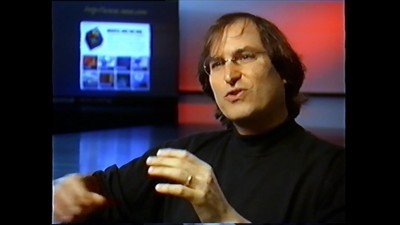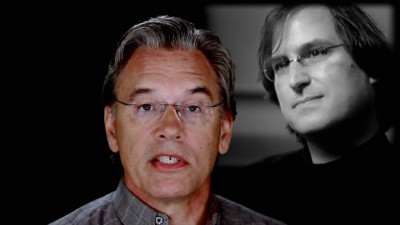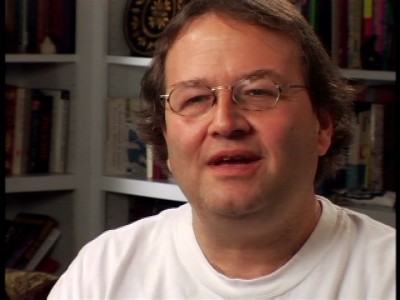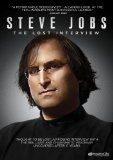| Reviews & Columns |
|
Reviews DVD TV on DVD Blu-ray 4K UHD International DVDs In Theaters Reviews by Studio Video Games Features Collector Series DVDs Easter Egg Database Interviews DVD Talk Radio Feature Articles Columns Anime Talk DVD Savant Horror DVDs The M.O.D. Squad Art House HD Talk Silent DVD
|
DVD Talk Forum |
|
|
| Resources |
|
DVD Price Search Customer Service #'s RCE Info Links |
|
Columns
|
|
|
Steve Jobs The Lost Interview
The Movie

Steve Jobs: The Lost Interview is a presentation that was briefly shown in theaters of a 70-minute interview with Steve Jobs (with Steve doing 99% of the talking), shot on video for a TV show called "Triumph of the Nerds" which aired in 1996 on PBS in the US and the BBC in the UK, and currently available separately on DVD.

It starts with a short intro with the original interviewer Robert Cringely (who also worked briefly with Jobs at Apple), as he explains that only short clips from the interview were actually used on the show, and the complete master tape was lost in shipment. A complete VHS copy was recently found by Paul Sen, the director of the series, in his garage, and that is what is presented here. Although Cringely says the interview is presented "in its entirety," there are a few moments where the playback freezes and the picture zooms in as Cringely comments on what Jobs is going to talk about next.
(I should note here to put my review in context, in case anyone is reading this critically, that I am not really a hard-core "computer nerd" although I was close to becoming one in the 1980s. In 1981 my dad bought an Apple II Plus computer, and I have fond memories of playing games on it, experimenting with BASIC programming and generally being wowed at what it could do. I was the only kid in my class to turn in written assignments printed on a dot-matrix printer, rather than hand-written or typed. I also read whatever computer magazines I could get my hands on and followed the industry a bit. By 1985 it just stopped being fun to me though- this was the same time as the "slump" in the video game industry. I did get back into video games for a while when the Nintendo Entertainment System came out, but largely had little interest in computers until 1995 when I first accessed America Online and later the internet. Today I enjoy most of what the internet has to offer, but know little about how it actually works.)
Jobs starts out talking about his first encounter with what was considered a computer in the 1960s, and how he landed a job at Hewlett-Packard at the age of twelve. He also tells of how he met Steve Wozniak and how they developed a "Blue Box", which mimicked special tones used by the phone company in those days in order to make long-distance calls for free. From there he discusses the founding of Apple and the development of its first personal computers, up until his being fired by the company's board of directors in the mid 1980s. At the time of this interview Jobs was the head of a new company, NeXT Computer, which he would eventually sell to a then-troubled Apple and return to that company. He had also invested heavily in Pixar Animation Studios, whose first feature film Toy Story would be released later in the year this interview was shot.
PictureI'm assuming Steve Jobs: The Lost Interview had its theatrical run only in digital format, as it was very brief and it would certainly be difficult to place reel changes on this as the interview is continuous with very few cuts. With that in mind, the presentation stays true to that, but I did find it annoying how the interview footage was processed to appear here at 24 frames per second (the frame rate of film and digitally-shot features) rather than its original 30 frames per second rate. (I don't know the particulars of theatrical digital projection or whether that is capable at showing video-based material at its proper frame rate or not, but traditionally features that included footage shot on video were transferred to film at 24 frames per second.) Some digital noise reduction also seems to have been applied, which I found more distracting than enhancing. The footage is presented in 4x3 with black side bars, with no cropping- the head-switching noise at the bottom of the screen is visible.
Sound:Audio from the interview tape sounds like it was taken from the linear audio track in mono. There's noticeable tape hiss, although the words are understandable enough.
Spanish subtitles are included on the disc. English text is provided only through standard closed-captioning, which presents a problem on modern equipment as those have been increasingly more difficult to access. Just because I'm obsessive and must be able to access everything that is included on a piece of media, I have a secondary connection from my Blu-Ray player to my TV using its component video ouputs set to 480i in order to get the captions. Newer players are excluding analog video outputs entirely, so as long as closed-captions are still going to be used on discs player manufacturers should include internal caption decoders to display them on the HDMI video signal.
ExtrasA commentary track is included with Robert Cringely and Paul Sen, recorded as they talk on Skype with Cringely in the US and Sen in England. I actually found this to be more entertaining than the actual interview, as they both give their impressions of Jobs (this is the second time in a commentary track where I've heard the speaker say of someone deceased that they would not want to work with them again.) What I found sort of baffling was how they comment how good the interview footage looks considering how "old" the VHS tape it came from is. As I have several VHS tapes dating back to 1979 and Betas to 1976 which still play perfectly, I hardly consider this one to be "old". They don't comment on the frame rate or anything else done for the theatrical release, but they do say that they had sat in on several showings and that the audience was riveted the entire time and many applauded at the end.

A 68-minute interview from 2005 with Andy Hertzfeld, the original programmer for Apple's Macintosh computer, is also included. This was also shot on video but processed at 24 frames per second. He also stays in the same place the entire time, but is very enthusiastic. He talks about how he purchased one of Apple's first personal computers and was so enthralled with it that he ended up working for the company, developing the first thermal printer and ultimately the Macintosh computer.
An audio interview, which plays over a menu screen, with Robert Cringely is included. He discusses his some of his personal experiences working with Steve Jobs, who he first met along with Steve Wozniak in 1977 at a computer club meeting.
Final Thoughts:Steve Jobs' admirers will most likely find The Lost Interview essential viewing, as will most people who have been following the computer industry from a historical perspective. I personally would have preferred a straighter transfer of the tape at the proper video frame rate.
Jesse Skeen is a life-long obsessive media collector (with an unhealthy preoccupation with obsolete and failed formats) and former theater film projectionist. He enjoys watching movies and strives for presenting them perfectly, but lacks the talent to make his own.
|
| Popular Reviews |
| Sponsored Links |
|
|
| Sponsored Links |
|
|
| Release List | Reviews | Shop | Newsletter | Forum | DVD Giveaways | Blu-Ray | Advertise |
|
Copyright 2024 DVDTalk.com All Rights Reserved. Legal Info, Privacy Policy, Terms of Use,
Manage Preferences,
Your Privacy Choices | |||||||












